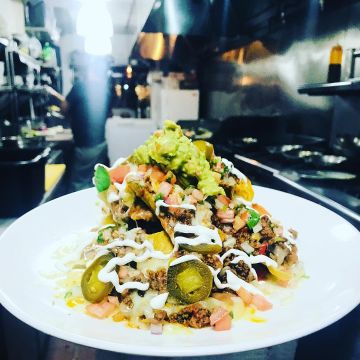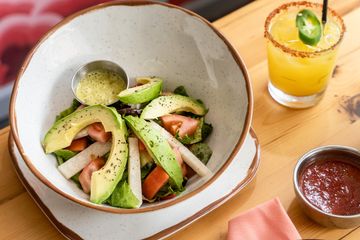Treat yourself to churros that are golden and irresistible
Is Mexican Food Healthy? Unloading the Nutritional Perks of Traditional Components
The concern of whether Mexican food is healthy welcomes an expedition of its standard active ingredients. Beans and corn offer as foundational staples, abundant in protein and fiber. Avocados offer helpful fats, while different herbs and spices include flavor and wellness benefits - mexican food. Together, these elements develop a tapestry of nutrition. However, the healthiness of Mexican food typically relies on preparation techniques and section sizes. What role do these aspects play in establishing its overall nutritional worth?
The Power of Beans: Healthy Protein and Fiber-Rich Staples
Although typically neglected, beans work as a foundation of Mexican cuisine, using a wide range of nutritional benefits. Rich in protein, they are a superb plant-based option for those looking for to satisfy their nutritional healthy protein needs. This high protein material sustains muscle mass repair and growth, making beans very useful for both vegetarians and meat-eaters alike. In addition, beans are an outstanding resource of dietary fiber, which helps in food digestion and advertises a feeling of fullness, possibly aiding with weight administration.
The selection of beans used in Mexican meals, such as black beans, pinto beans, and kidney beans, adds to a varied taste account and can improve meals nutritionally. Beans are reduced in fat and have important vitamins and minerals, consisting of magnesium, iron, and folate. Together, these features make beans an important active ingredient, supplying both nourishment and nourishment in conventional Mexican fare.

Corn: a Versatile Grain With Nutritional Advantages
Corn stands out as a flexible grain basic to Mexican food, celebrated not just for its culinary applications however additionally for its outstanding dietary profile. As a main active ingredient in recipes like tortillas, tamales, and pozole, corn supplies vital nutrients that add to a well balanced diet. Rich in carbs, it serves as a significant power resource, while also being reduced in fat, making it a desirable alternative for different nutritional demands.
Additionally, corn is an excellent resource of nutritional fiber, which assists in digestion and advertises satiety. It has substantial amounts of vitamins such as B-complex vitamins, which are crucial for basal metabolism. The existence of antioxidants, especially carotenoids, adds to general health and wellness by decreasing oxidative stress. In addition, corn is gluten-free, satisfying those with gluten sensitivities. Overall, the nutritional benefits of corn emphasize its value in typical Mexican food and its duty in a healthy diet.
Avocados: Healthy Fats and Nutrients in Every Bite
Avocados play a substantial function in Mexican food, matching dishes with their creamy appearance and rich flavor. Beyond their cooking allure, avocados are celebrated for their excellent nutritional profile. They are a rich resource of healthy and balanced monounsaturated fats, which can help lower poor cholesterol degrees and support heart wellness. Additionally, avocados are loaded with essential minerals and vitamins, including potassium, vitamin E, and B vitamins, contributing to overall health.
The high fiber material in avocados help food digestion and promotes satiety, making them a helpful go to this web-site enhancement to any kind of meal. Their special nutrient make-up can likewise support skin wellness and supply anti-inflammatory advantages. Integrating avocados right into standard Mexican dishes or appreciating them as a standalone treat can enhance both flavor and nutrition, demonstrating why they are a cherished staple in Mexican cuisine. Generally, avocados use a tasty way to take pleasure in healthy fats and important nutrients in every bite.

Natural Herbs and seasonings: Flavorful Health Boosters
While taking pleasure in the rich flavors of Mexican cuisine, one can not neglect the crucial duty that spices and natural herbs play in enhancing both preference and health. Active ingredients such as chili, cilantro, and oregano peppers not just contribute to the vibrant taste profile however likewise provide substantial health and wellness advantages. For circumstances, cilantro is known for its purifying residential or commercial properties, assisting to get rid of hefty metals from the body, while oregano is packed with anti-oxidants and has anti-inflammatory effects.
Chili peppers, a staple in many Mexican dishes, contain capsaicin, which has been linked to enhanced metabolic rate and discomfort relief. Additionally, seasonings like cumin and coriander assistance digestion and may help in blood sugar level policy. Integrating these delicious health and wellness boosters into meals not just improves the cooking experience yet additionally promotes total wellness, making Mexican food not just delicious, yet also nutritionally useful.
Typical Cooking Techniques: Enhancing Nutrition and Taste
Traditional food preparation approaches in Mexican food play an essential role in improving both nutrition and taste, as they usually focus on fresh components and time-honored strategies. Strategies such as nixtamalization, where corn is soaked and cooked in an alkaline service, not only boost the nutrient account of tortillas but likewise improve their digestibility - hand crafted margarita. Additionally, making use of sluggish cooking approaches, like stewing or braising, permits tastes to blend perfectly while maintaining the stability of the ingredients
Often Asked Inquiries
Are Mexican Food Portions Normally Larger Than Various Other Foods?
Mexican food sections are frequently larger than those of numerous various &pizza other cuisines. This particular shows conventional dining methods, stressing communal sharing and hearty meals, which can cause an extra significant offering size overall.
Just how Does the Preparation Approach Affect Healthiness of Mexican Food?
Prep work techniques significantly affect the healthfulness of Mexican food. Methods such as grilling or steaming maintain nutrients, while frying can increase harmful fat content. Selections of ingredients and cooking designs inevitably establish overall dietary worth.
Can Mexican Food Be Customized for Specific Nutritional Constraints?
Mexican food can undoubtedly be tailored for specific nutritional restrictions. Alternatives, such as using corn tortillas for gluten-free diet plans or incorporating even more veggies, enable people to enjoy standard tastes while fitting numerous nutritional demands.
What Prevail Misconceptions Regarding Mexican Food and Wellness?
Common mistaken beliefs concerning Mexican food include the idea that it is naturally unhealthy, excessively zesty, and solely concentrated on fats. In fact, traditional dishes usually include nutritious components and can be customized to different nutritional requirements.
Exist Healthier Options at Mexican Restaurants?
Much healthier options at Mexican dining establishments frequently include grilled meats, beans, and fresh vegetables. Selecting Continued meals that highlight whole components and preventing hefty sauces can cause an extra nourishing dining experience, promoting general wellness.
The range of beans utilized in Mexican meals, such as black beans, pinto beans, and kidney beans, adds to a diverse flavor account and can enhance dishes nutritionally. Avocados play a significant duty in Mexican cuisine, enhancing recipes with their creamy structure and rich taste. Incorporating avocados right into standard Mexican recipes or enjoying them as a standalone treat can improve both flavor and nutrition, demonstrating why they are a beloved staple in Mexican cuisine. While delighting in the rich flavors of Mexican food, one can not ignore the necessary function that spices and herbs play in enhancing both preference and health and wellness. Conventional cooking approaches in Mexican food play a vital function in enhancing both nourishment and flavor, as they frequently prioritize classic methods and fresh ingredients.